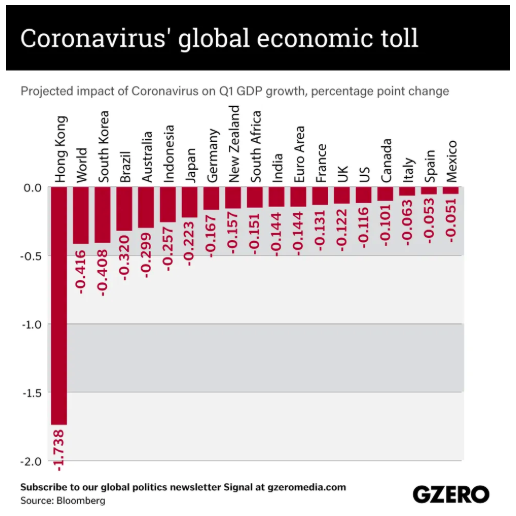El jefe de la Organización Mundial de la Salud, Tedros Adhanom Ghebreyesus, pide a los países que se despierten y consideren al coronavirus como el enemigo público número uno.
La frase enemigo público número uno denota algo o alguien que significa una seria amenaza para el bienestar o la seguridad de una comunidad o nación, y así como el término se usó para designar a Al Capone hace un siglo en el Chicago Daily Tribune , hoy el mundo enfrenta un enemigo nuevo y diferente.
El mundo debe “despertar y considerar a este virus enemigo como el enemigo público número uno”, dijo a los periodistas el jefe de la OMS, Tedros Adhanom Ghebreyesus , mientras asistía a una conferencia de prensa sobre el nuevo coronavirus (2019-nCoV) en Ginebra , Suiza, el 11 de febrero de 2020. Tedros Adhanom agregó que “si el mundo no quiere despertar y considerar al virus como el enemigo público número uno, no creo que aprendamos de nuestras lecciones”.
Now that the global death toll from the deadly Wuhan coronavirus has topped 900, officially surpassing the 2002-03 SARS outbreak, and companies have begun massive layoffs, with industries desperately looking to shift trends and investments, we start to wonder if we truly are before a new public enemy, one that instead of haunting the streets, it invades our Twitter and Facebook feeds as well as our sentiments on traveling and certain demonyms.
Effects have already been seen worldwide, and especially when China is the European Union’s second-biggest trading partner, the world’s leading exporter, accounting for a fifth of global GDP, and central to a diverse range of global supply chains. According to the Financial Times, to attend this matter and avoid slowing down productions, China’s State Council has urged critical industries — such as aviation — to resume operations as soon as possible. Cities like Beijing and Shanghai have seen their citizens turn to home-office to continue productivity, but companies like electronics manufacturing giant Foxconn have only partially restarted their production. And while these decisions seem logical, the expected delay in getting Foxconn’s factories back up and running could reportedly hurt the world’s iPhone supply, according to The New York Post. Qualcomm, the world’s biggest maker of smartphone chips, has also warned the world population that the outbreak was causing “significant” uncertainty around demand for smartphones.
CNN Business stated that car plants across China have been ordered to remain closed following the Lunar New Year holiday, preventing global automakers Volkswagen, Toyota, Daimler, General Motors, Renault, Honda and Hyundai from resuming operations in the world’s largest car market. Luxury goods makers, which rely on Chinese consumers who spend big at home and while on vacation, have also been hit. British brand Burberry has closed 24 of its 64 stores in mainland China.
The struggle has inevitably turned international, and it’s now hitting foreign pockets. According to a study by the World Bank, a severe pandemic could cause economic losses equal to nearly 5% of global GDP, or more than $3 trillion. Why? Because as supply chains are diverted and travel methods are cut, the GDP growth of select countries is at risk, especially when uncertainty reigns as there is no efficient flow of accurate information within countries and across borders.
According to GZERO and Bloomberg, countries like South Korea, Brazil, Australia, Indonesia, Japan, Mexico, India, and the US are among the countries experiencing a slash into their growth forecast for both the first quarter and the full year. China’s real gross domestic product is now forecast to grow 5.8% this year, according to the median result in a Bloomberg survey. That’s down from 5.9% in January 2020.


Of course, the tragedy of some is the benefit of others, and some industries are before a big marketing opportunity that can give them a substantial short-term bump. Big drugmakers like Inovio, Johnson & Johnson, Novavax, Moderna, and GSK are all working on coronavirus treatments and seeing their stocks rise as an urgent vaccines or treatment is being awaited, however according to TIME Magazine, health officials say a vaccine version may take three months to be available for the first stages of human testing while developing an effective vaccine generally takes years.
A pesar de los notorios cambios que ya ha provocado, el brote podría empeorar un poco antes de mejorar, según Janez Lenarcic, comisario europeo de gestión de crisis, especialmente en términos de aspiraciones económicas y preparación para el corto, medio y largo plazo. .
“Con respecto a esta epidemia, las fábricas chinas se ven afectadas, y eso, por definición, afecta las cadenas globales y la economía global. Pero nuestra máxima prioridad debería estar dedicada a las medidas de salud pública, y las consecuencias económicas son, por supuesto, secundarias, aunque no sin importancia ” , dijo .
Haga clic aquí para leer acerca de los niveles de seguridad sanitaria global en 195 países, enumerando qué tan preparados están algunos países en lo que respecta a la capacidad de responder a una epidemia / pandemia.












